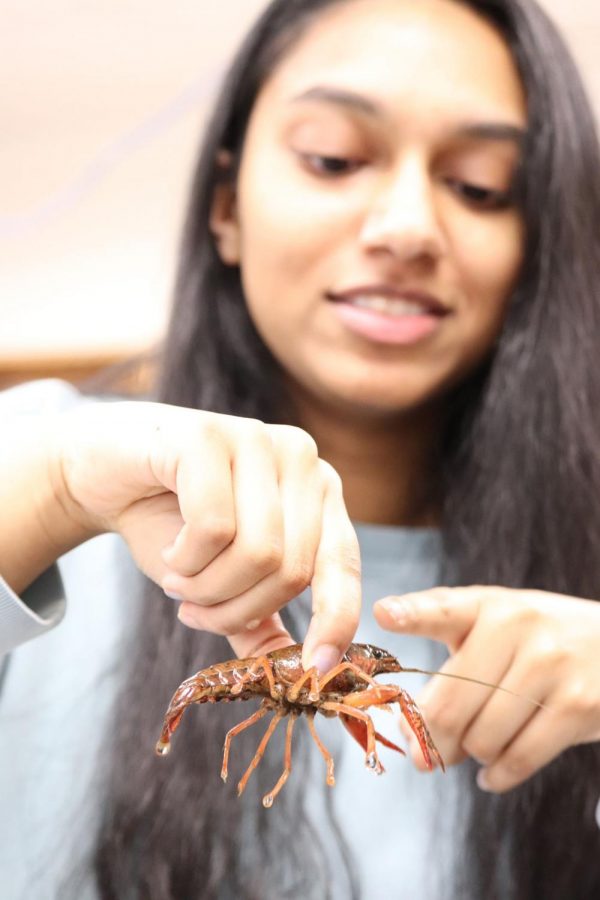Changing expectations
Seniors run into unexpected roadblocks while conducting research.
Holding the crayfish in one hand, senior Tanya Kurnootala points to its eye with the other. Her project, taking place on the neuroscience lab, requires measuring the visual responsiveness of crayfish when its affected by blue light. “The crayfish is a really good model organism because it has the ability to regenerate,” Kurnootala said.
February 7, 2020
Last week, sophomores recently visited research labs to learn more about potential projects. However, they should remember that what they may be thinking of doing now, is far from what they will end up doing.
Seniors are busy working on research projects that they have been thinking about since junior year. Expectations are high, and seniors will have to present their final results at tjStar, some at even larger science fairs such as the Intel ISEF. But almost all seniors can agree their projects are far from what they expected junior year.
Take senior Tony Liang, who is doing his project in the Computer Systems Lab.
“Our original plan was to make a self-driving go-cart,” Liang said. “We originally wanted to train a neural network to follow some traffic patterns we create, such as stop signs, driving on the right, and changing lanes.”
However, with the first semester of the year already over, his project has changed drastically from its original intentions.
“We probably will not get to make a full-size go-cart. Also, instead of teaching the car to drive on a closed course following traffic rules that we make, we will train it to drive around the hallways without crashing into walls,” Liang said.
The Cause:
Liang is just one of many, and with so many seniors across all labs experiencing the same issues, it begs the question as to why this happens.
According to lab directors, it’s a natural part of the research process and science as a whole.
“It isn’t seen as a ‘problem’ but the natural course of things. As we learn more we see that which we didn’t know… and evolve our approach and/or our expectations,” Laura Locklear, director of the Neuroscience Lab said
She also adds that in real research labs, many professional researchers go through the same struggles and limitations that Jefferson seniors face.
“Let’s say you finish your doctoral degree and you go to a lab, you’re hired by a lab, you can’t just do anything you want. You can’t do anything that you want to because of the limitations that are within the lab. Anybody who’s done a lot of reading into published scientific literature will know there’s no experiment that’s ever been published, that is a perfect experiment; there are always limitations. So you get to a lab and you learn what those are. And then you do what you can do within those constraints,” Locklear said.
Senior Avyuk Dixit’s experience confirms this sentiment.
“After the New Zealand shooting last year, we thought of creating a method for detecting violence in real-time from video surveillance feed; because one of the things that happened in the new Zealand shooting was that there was a Facebook Live Stream that recorded it as it happened, but nobody saw it in time to react,” Dixit said.
Originally, his group had planned to spend most of the year building the model for the data and writing the research report. However, building the model only took them a month. Instead, they have spent most of time researching methods to parse the vast amount of data to train their neural network.
“When we originally started the project junior year we had limited data to work with but this year we got access to a much larger dataset with like tens of thousands of hours of footage to work with,” Dixit said. They are still working on this task.
However, issues like these and unexpected tribulations are common among research projects. Lab directors feel that these issues shouldn’t demotivate students, and instead, students should work to overcome them.
“Once a project gets going, the idea is to do it. That doesn’t mean that they won’t encounter a lot of challenges, but the objective is to do that project. So we got to overcome the challenges, whatever challenges that come up,” Locklear said.
The Solution:
However, research labs have still taken measures to prevent these issues from happening in the future.
In the Computer Systems Lab, for example, a series of changes in recent years have been implemented to prevent students from experiencing false starts and dead ends.
“We do a lot of work in the spring of junior year to help the students find a good project. This includes a timeline for their senior year with benchmarks. Most students will stay close to their plan because we don’t approve plans that we think will fail. We observe fewer false starts and dead ends now than we did 15 years ago,” Director of the Computer Systems Lab Shane Torbert said.
However, he also stated that it isn’t necessarily a problem if students do end up with a project that doesn’t come to fruition.
“It isn’t our goal for the student to fulfill their original goal. Our goal is for the student to have a positive research experience. For most students, the senior research lab is their first experience of this kind. It can’t be simulated over a shorter length of time. If at the end of the year they have an accurate sense of what it means to undertake a research project then we consider that success whether or not they fulfilled their original goal, and whether or not they then intend to pursue more research in the future,” Torbert said.
You can read more about the research program at Jefferson here.






